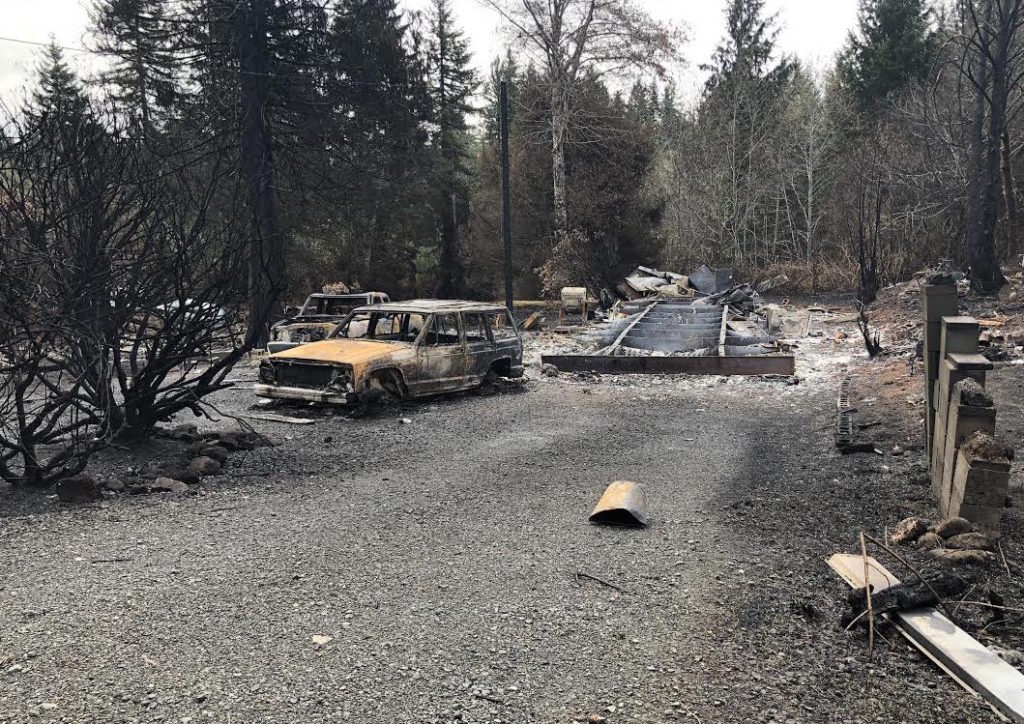
By ZACH URNESS/Salem Statesman Journal
Victims in four of Oregon’s Labor Day fires could get additional compensation from PacifiCorp following a ruling Thursday from Multnomah County judge Steffan Alexander.
The circuit court judge ruled PacifiCorp can face punitive damages — in addition to compensatory damages — in a class action lawsuit that blames the utility for igniting wildfires that burned 2,500 properties.
The trial is scheduled to begin April 24.
Plaintiffs in the case, who include residents of Otis in Lincoln County, allege PacifiCorp’s failure to maintain its power lines and shut down power during the historic wind event Labor Day night of 2020 led to the ignition and spread of the Echo Mountain, Santiam/Beachie Creek, 242 and South Obenchain fires.
The utility, which said it couldn’t comment on ongoing litigation, has maintained the wildfires were an unavoidable natural disaster.
Thursday’s ruling is significant because it allows a jury, should it find PacifiCorp at fault, to impose higher damages and pay out significantly more to victims.
Previously, a jury could have found PacifiCorp liable and required that they pay victims compensatory damages for things such as housing losses, displacement costs and emotional distress. By adding the option of punitive damages, basically a punishment meant to act as a future deterrent, a jury could multiply the amount paid out to victims.
PacifiCorp is owned by Berkshire Hathaway.
Alexander made the decision after reviewing evidence that included communications between PacifiCorp employees noting that wildfires were springing up directly below the utility’s power lines. Other evidence included testimony from a fire behavior analyst who witnessed power lines ignite fires in the Santiam Canyon, and additional testimony from Consumers Power Inc. officials who shut down their power to avoid ignitions.
The court sets a fairly low bar in determining that punitive damages can be included.
“In viewing the totality of the evidence in the light most favorable to Plaintiffs, Plaintiffs’ evidence is sufficient to raise the jury determination of whether PacifiCorp’s conduct rose to the level of a reckless and outrageous indifference to and highly unreasonable risk of harm, and whether PacifiCorp has acted with the conscious indifference to the health, safety, and welfare of others that would warrant an award of punitive damages,” Alexander wrote.
In its court filing, PacifiCorp argued that the evidence did not amount to much.
“The majority of evidence and testimony cited in Plaintiffs’ motion is either inadmissible, irrelevant to the four fire areas, or both,” PacifiCorp lawyers wrote. “Plaintiffs also twist what little relevant evidence they do cite, casting reasonable plans as sinister, portraying employees’ lack of knowledge about other departments’ job responsibilities as reckless, and even suggesting that PacifiCorp’s regulatory mandate to provide safe and reliable electricity was somehow malicious.”
Of note, 2 1/2 years after they occurred, federal and state officials have not released a final investigation report into the causes of the fires, and they remain officially “under investigation.”
The lack of a government explanation for what happened sets up a scenario in which the jury trial will lack what would normally be a key piece of evidence in determining who’s at fault.
- This story originally appeared in the Salem Statesman Journal on March 23.



